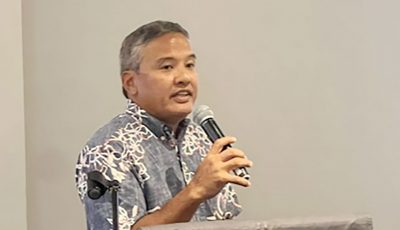Potential abuse causes PH removal
Torres: Where do we get our workers now?
The potential for abuse of the H-2B visas was the reason why U.S. Citizenship and Immigration Services removed the Philippines from the said worker visa program. Department of Homeland Security in last Friday’s Federal Register declared the Philippines along with the Dominican Republic and Ethiopia as three countries that are no longer eligible for the H-2B visa.
USCIS is one of the subordinate agencies under DHS that is currently headed by Secretary Kirstjen Nielsen. The DHS-USCIS decision was in concurrence with U.S. Secretary of State Mike Pompeo, saying that the three countries almost have the same factors that resulted from their removal.
Abuse, denial and overstay rates, fraud, human trafficking concerns, and other forms of non-compliance with the terms and conditions were the factors listed as the reasons why USCIS would exclude or remove nationals of certain countries from the H-2 visa programs. Workers, whose visas were approved before the decision, are not affected.
DHS and the State Department, according to the Federal Register, said Filipino nationals who hold H-2B visas have a high rate of going beyond their authorized period of stay in fiscal year 2017. Their recent review showed a 40-percent overstay rate and a 60-percent volume that were determined to have been trafficked to the U.S. using the H-2B visa.
“DHS and DOS are concerned about the high volume of trafficking victims from the Philippines, who were originally issued H-2B visas and the potential that continued H-2B visa issuance may encourage or serve as an avenue of future human trafficking from the Philippines,” as stated in the Federal Register notice.
DHS and DOS added that their overstay and human trafficking concerns also warranted the Philippines’ removal from the H-2A visa as well. “This concern is informed by a four-fold increase in H-2A visa applications from nationals of the Philippines between FY 2015 to 2018. The Philippines’ continued inclusion creates the potential for abuse, fraud, and other harm to the integrity of the H-2A or H-2B visa programs.
The H-2A visa are for foreign nationals to be allowed entry for temporary or seasonal agricultural jobs, while the H-2B is for non-agricultural related work. H-2B visas are used by the CNMI and Guam to hire foreign labor in the construction sector, where both U.S island territories enjoy no numerical limit on the number of approvals.
The Dominican Republic has an estimate of nearly 30 percent overstay rate for H-2B visa holders in FY 2017 while Ethiopia was designated as an “at risk of non-compliance” since 2016 based on U.S. Immigration and Customs Enforcement’s biannual assessment on the issuance of travel documents for citizens, subjects, nationals, and residents of the said country.
Reactions
Gov. Ralph DLG Torres has asked Delegate Gregorio Kilili C. Sablan (Ind-MP) to use his position to act on the issue and find a possible solution on USCIS’ decision to take away the visa classification used by the CNMI to get foreign construction workers. “All our construction workers are H-2Bs. Now that the Philippines is out, where do you expect our businesses to get the workers they need?”
“I’m not sure how many workers are affected, but it is pushing us even worse to where we are at. Now we have the Democratic leadership in the [U.S.] House, I would like to ask Congressman Kilili to make use of his position to do proper and permanent action for stability not only for H-2Bs but overall long-term status and other issues regarding our immigration.”
“I will be sending a letter to [DHS] outlining our labor needs and economic viability. I [also] ask Delegate [Sablan] to utilize his position in the House majority to safeguard our economy and our businesses. We now see that his bill H.R. 339, which bans new construction workers from applying for CW1 permits, will negatively impact us because we cannot bring in additional construction workers from the Philippines now. This issue is too important, and our administration will continue to make sure our economy is protected for our success.”
He added that the removal of the Philippines from the H-2B program would affect the ongoing construction projects in the CNMI. “Not only [Imperial Pacific], but also the small construction businesses. How many construction workers from the Philippines do we have and you take that amount from small construction firms, it equates to the same number with the big companies.”
“These construction workers from the Philippines are not just simply construction workers here, but they are actually family members too. So, we would like to ask Congressman [Sablan], since he represents us in the U.S. Congress, to please use his position to find permanent action to our situation.”
Torres added that Filipinos have been an instrumental part of the CNMI even before it became a Commonwealth. “Since the early 1970s, they have played a vital role in our economy through various job categories and the remain our friends, neighbors, and family. I recognize the issue of overstayers, but I believe we have done our share of enforcement locally and have worked with our federal partners on cracking down on bad actors.”
“This will be a significant hit to the CNMI economy because we are an economy limited by labor and our location. The Philippines is the closest country to our islands, and they have been our primary source of labor for decades. There is no doubting the contributions of our Filipino community, and we will continue our efforts to emphasize our need for laborers in order to continue our progress.”
Lt. Gov. Arnold I. Palacios added that USCIS’ decision was a surprising turn of events for the CNMI’s developing economy and the islands still recovering. “The Philippines is one of the largest sources for our H-2B visas for construction so this is going to have an impact on our economy especially as we recover.”
“This affects the government too, as it may negatively impact our CIP projects, our recovery and rebuilding efforts, other infrastructure resiliency projects for development. We will be proactive and work something out with our federal partners. We look to work with Gov. Lou Leon Guerrero and Lt. Gov. Josh Tenorio on remedies for the CNMI and Guam.”
Press secretary Kevin Bautista said USCIS’ decision was disappointing news for the CNMI since the administration has worked with the business sector to solve the Commonwealth’s workforce issues.
“Over the last several years, we have worked with our private sector partners to transition workers to the H-2B program due to the limitations imposed on our CW program, especially for construction. We will closely monitor the impact it will have on our construction industry,” said Bautista.
“As we continue to hone in on our local workforce development initiatives, the administration will continue to work with our federal partners to address not just this critical issue, but to also advocate for our viability as an island economy that just wants to succeed for our people.”
House Federal and Foreign Affairs Committee chair Rep. Luis John Castro (R-Saipan) said he has met with some of his colleagues to map out a plan of action. “I know from the House side we are monitoring the situation very closely. The FAA committee is going to monitor the situation and will be working with our federal partners as well to come to terms with this situation. It is going to affect us tremendously, it is something that we have to monitor closely.”
Rep. Ivan A. Blanco (R-Saipan) added the decision would impact the CNMI’s construction industry since non-U.S. eligible construction workers do not fall under the CW-1 worker program. “I was under the impression that the H2B category was supposed to bridge this gap.”
“With this recent notice, we will not be able to employ H2B employees from the above countries. It almost feels like we just lost our last oar to paddle our canoe forward. I look forward to working with fellow government officials and industry experts to find a solution at the soonest.”



























